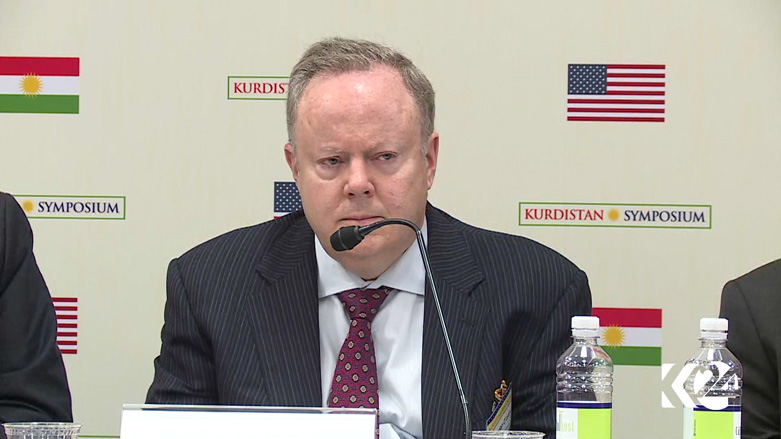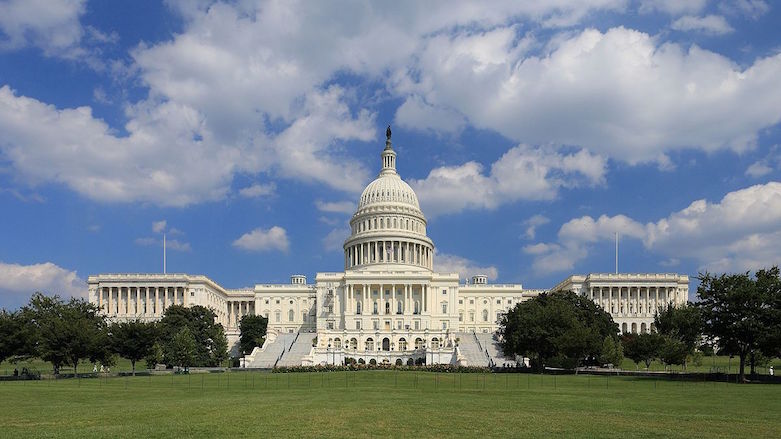Prof. Brendan O’Leary: Kurdish referendum, independence are necessary step

WASHINGTON DC, United States (Kurdistan 24) – Professor Brendan O’Leary recently explained to a Capitol Hill audience why the upcoming referendum on Kurdish independence, as well as independence itself, is a legitimate objective for the Kurdistan Region and is entirely lawful.
O’Leary is the Lauder Professor of Political Science at the University of Pennsylvania—an Ivy League institution founded by Benjamin Franklin, one of America’s most distinguished and brilliant Founding Fathers, whose portrait has graced the 100 dollar bill for the past 100 years.
The University of Pennsylvania scholar has 22 books to his name—as author, co-author, and editor. An Irishman by birth, O’Leary has focused on political issues involving power-sharing, national and ethnic conflict-regulation, and national self-determination.
He has served as an adviser to the Kurdistan Regional Government (KRG), including during the drafting of Iraq’s Transitional Administrative Law in 2004 and of Iraq’s permanent constitution the following year.
Speaking at a July 28 conference, co-sponsored by The Washington Times and Kurdistan24, O’Leary explained that he was first asked to advise the KRG in 2002 and 2003 “to assist them in future negotiations with Baghdad” on “how to make the federal power-sharing system work.”
But fourteen years on, “The system has not worked,” O’Leary declared.
There is “no question” that the leadership of the two major Kurdish parties—the Kurdistan Democratic Party (KDP) and the Popular Union of Kurdistan (PUK)—tried very hard “to make Iraq into a democratic federation,” O’Leary said.
However, the effort failed. The Iraqi Constitution was intended to establish a decentralized federal state. But as O’Leary related in some detail, “critical provisions” of the constitution were “never applied” or “have been abused.”
Article 140 was intended to decide the fate of the “disputed territories,” areas Arabized under the rule of Saddam Hussein. Following specific steps to achieve some normalization of the situation, there was to be a referendum among the residents of those areas to determine their future. The process was to be completed by 2007.
Ten years on, Article 140 has not been implemented. The “obvious reason,” O’Leary suggested, is that “the Baghdad government didn’t wish it to be implemented.”
In fact, there are “a whole range of other transitional provisions in the Constitution that have not been implemented,” O’Leary explained.
Indeed, the only such provisions that have been implemented, he said, “are those that consolidate the power of the Shiite majority.”
The presidency was originally intended to facilitate power-sharing, allowing the president to “veto transgressions.” However, the presidency no longer “has that kind of power.”
There was supposed to be a second, federal legislative chamber, but there is none.
The Constitution provides for a supreme court, but there is none.
“A federation that doesn’t have a second chamber to protect the right of regions and governorates and doesn’t have a supreme court isn’t a federation,” O’Leary stated.
“And it’s for that reason that Kurdistan has the right to leave,” he affirmed.
The professor also recounted the failure of another key constitutional provision: the constitution allows governorates to become regions and gain significantly more authority over their own affairs. However, with the exception of the Kurdistan Region, that has not happened.
“Six governorates tried to do so,” but “in each case, they were unlawfully and sometimes coercively and violently blocked,” O’Leary explained.
“The federal government has not provided security” to minorities—Christians, Yezidis, and others—“particularly in disputed territories,” he continued.
“Constitutionally unlawful Shiite militias” have proliferated, “and in no sense does the Iraqi army resemble the army” set forth in Iraq’s constitution.
Moreover, Baghdad has “denied the Kurds their budgetary entitlements, especially since 2014, “at a moment of pivotal need”—when the Islamic State (IS) captured Mosul, and the Peshmerga assumed a crucial role in fighting the terrorist organization.
“A permanent constitution cannot be permanently violated and yet permanently enforced on the people who live under it.”
“A referendum was used to ratify Iraq’s constitution. And so, logically, a referendum can be used to end Kurdistan’s commitment to a constitution that has not worked,” he said.
“The Constitution of Iraq was a voluntary union of land and people,” O’Leary observed. And “a voluntary union can be voluntarily dissolved, especially when the contract is broken.”
Editing by G.H. Renaud

